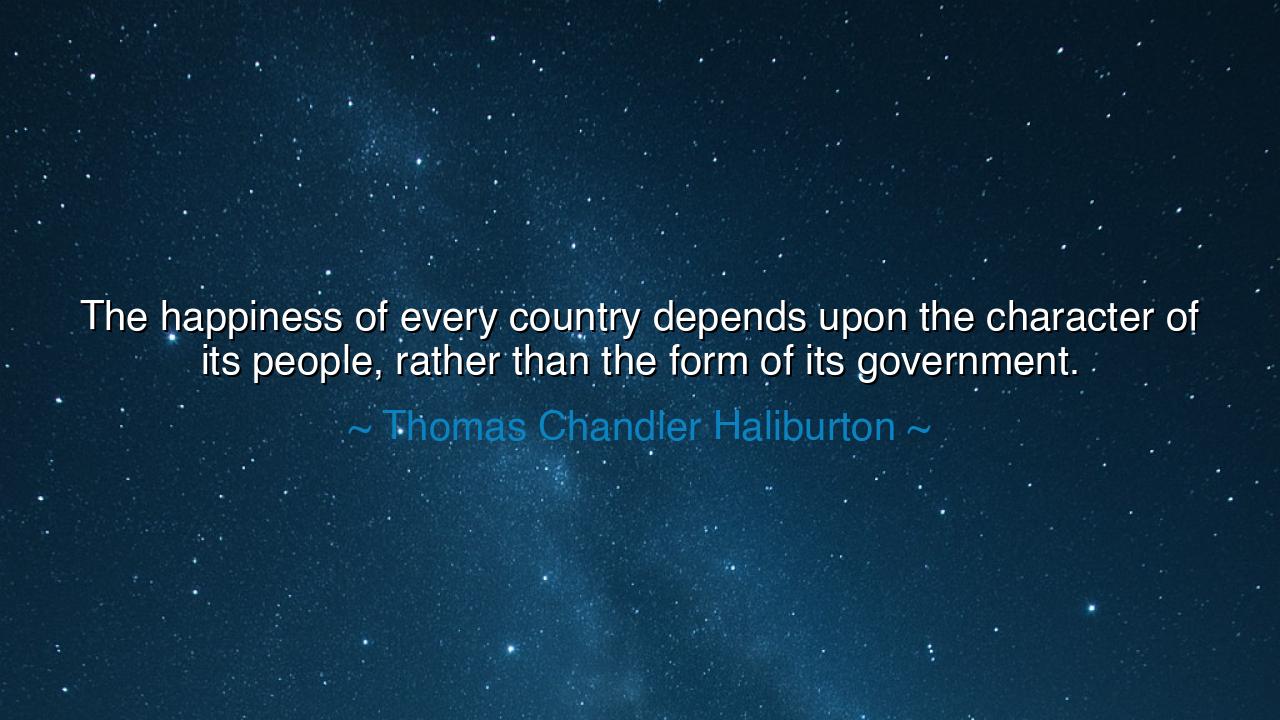
The happiness of every country depends upon the character of its
The happiness of every country depends upon the character of its people, rather than the form of its government.






"The happiness of every country depends upon the character of its people, rather than the form of its government." – Thomas Chandler Haliburton
In this timeless truth, Thomas Chandler Haliburton, the Canadian judge and writer of the nineteenth century, lays bare the moral foundation upon which all nations stand. His words strike like the tolling of an ancient bell, echoing across the centuries: that no constitution, no law, no government, however well designed, can preserve the happiness of a people whose hearts are corrupt or whose spirits are idle. The character of a people—their honesty, courage, compassion, and sense of duty—is the soul of their nation. Without it, even the most perfect form of government becomes but an empty shell. Haliburton reminds us that political forms are scaffolding, but the true structure of civilization is built from the virtues of its citizens.
The origin of this quote comes from Haliburton’s deep observation of human nature and society. Living in an age of expanding democracy, industrial revolution, and colonial transformation, he saw that nations were endlessly debating systems—monarchy versus republic, capitalism versus socialism—while neglecting the inner condition of man. To him, the true engine of prosperity and peace was not found in the machinery of government, but in the moral fiber of the governed. He witnessed how countries with different political systems could flourish if their people were upright, yet how even free republics could decay when self-interest overpowered virtue. His words were less about politics than about the eternal law of moral cause and effect—that no society can rise higher than the character of its people.
This truth has been proved again and again throughout history. Consider the fall of ancient Rome, once the mightiest empire on earth. Its laws were refined, its institutions magnificent, its armies invincible. Yet as luxury replaced discipline, and greed devoured patriotism, the empire rotted from within. No tyranny conquered Rome—it collapsed beneath its own moral decay. Bread and circuses dulled the will of the citizens; corruption infected the Senate; and the people, once noble in virtue, became slaves to comfort. Haliburton’s words would have rung like prophecy to those who watched Rome burn: for where the character of the people declines, no form of government—monarchy, democracy, or empire—can long endure.
By contrast, look to the humble beginnings of the American Republic. Its founders did not place their faith solely in laws or documents, but in the virtue of the citizen. George Washington, in his farewell address, declared that “religion and morality are indispensable supports” to political prosperity. They knew that liberty, without virtue, would descend into license; that freedom, without discipline, would destroy itself. Thus, their constitution was not a magic spell but a covenant—one that would live only as long as the people remained worthy of it. The endurance of that nation, through war and turmoil, has rested not merely on its structure of government, but on the character, sacrifice, and moral courage of its people.
Haliburton’s wisdom carries another layer of meaning: happiness is not given by governments—it is created by citizens. A good government can protect liberty, but it cannot bestow integrity. It can secure rights, but not righteousness. The happiness of a nation flows not from decrees or institutions, but from the quiet virtues of its families, its teachers, its workers, its dreamers. When people are industrious, kind, and just, their land will be peaceful. But when they become envious, slothful, and divided, even the fairest government will fail to make them happy. For happiness is the harvest of character, and no ruler, however wise, can grow it in soil that has turned to stone.
This principle reaches even to the smallest scales of life. A household, like a nation, thrives on the character of its members, not the structure of its rules. A family built on trust and respect will flourish in a shack; a family without them will wither in a palace. So too with nations: virtue is the unseen foundation upon which all prosperity rests. To build a nation without virtue is to build a temple upon sand.
The lesson Haliburton leaves us is as urgent now as it was in his time: seek not merely to reform governments, but to refine souls. Citizens who are honest need few laws; those who are corrupt will break every one of them. If we would preserve the happiness of our nations, we must begin not in parliaments or congresses, but in our homes, our schools, and our hearts. Teach integrity, honor labor, reward kindness, and cherish truth—these are the true policies of a thriving state.
For in the end, no constitution can save a people who do not wish to save themselves. The happiness of nations is not written in charters, but in character; not secured by governments, but by goodness. Let every man and woman therefore live as if the fate of their country rests upon their virtue—for indeed, it does. When the character of the people is strong, their government will be just; and when their hearts are noble, their land will shine among the nations, radiant with peace, dignity, and enduring joy.






AAdministratorAdministrator
Welcome, honored guests. Please leave a comment, we will respond soon